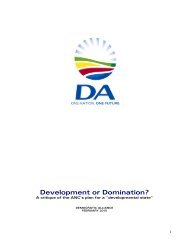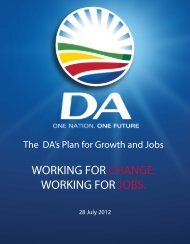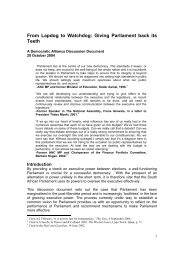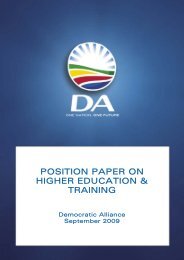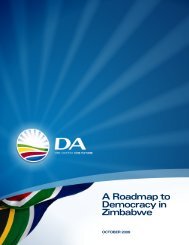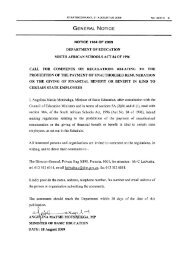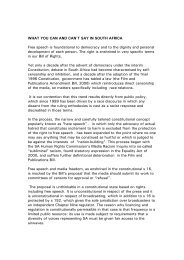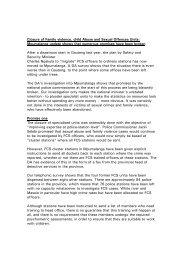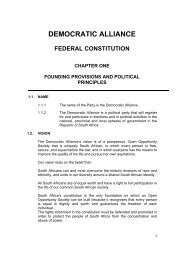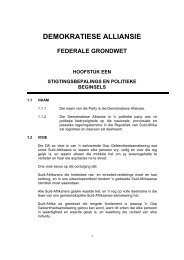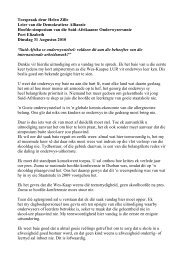Economic policy.pdf - Democratic Alliance
Economic policy.pdf - Democratic Alliance
Economic policy.pdf - Democratic Alliance
Create successful ePaper yourself
Turn your PDF publications into a flip-book with our unique Google optimized e-Paper software.
CREATING ECONOMIC<br />
OPPORTUNITIES FOR ALL<br />
February 2009
Creating <strong>Economic</strong> Opportunities for All<br />
EXECUTIVE SUMMARY<br />
At a time of almost unprecedented international financial uncertainty, the <strong>Democratic</strong><br />
<strong>Alliance</strong> (DA) today outlines our vision for the future of South Africa’s economy, in the<br />
form our new economic <strong>policy</strong> “Creating <strong>Economic</strong> Opportunities for All”. Our <strong>policy</strong><br />
will give all South Africans the opportunity to take charge of their own lives and make<br />
the most of their potential.<br />
We see a future in which the government and the private sector work together in<br />
partnership to grow an economy ripe with opportunities for all South Africans, most<br />
especially for the millions of unemployed South Africans who have been denied<br />
access to jobs and life changing opportunities. In our vision, every South African has<br />
an opportunity to move forward to a more prosperous future and in so doing not only<br />
improve their own lives and the lives of their families, but to reinvigorate our nation as<br />
a whole.<br />
The failure of the sub-prime mortgage industry and the resulting collapse of bank and<br />
insurance companies in Europe and the USA has strangled credit lines and has led<br />
to an international economic crisis on a scale unseen since the Great Depression of<br />
the 1930s. Demand has dried up and South Africa’s major trading partners in the US,<br />
the EU and Japan are in recession. India and China whose appetite for our<br />
commodities is vital to our own economic prosperity are also facing slowing growth.<br />
Around the world stock markets have collapsed; large financial institutions have gone<br />
under or been bought out; and in the United States and Europe, governments had to<br />
come up with rescue packages to bail out their financial systems.<br />
Clearly South Africa is not immune from the challenges facing the international<br />
economy. We are already experiencing large-scale job losses, the international<br />
prices for our commodities have fallen and key high employment industries in the<br />
mining, manufacturing and retail sectors are experiencing dramatic slowdowns.<br />
South African <strong>policy</strong> makers have two responsibilities; not only do they need to<br />
respond to the immediate problems caused by the credit crisis but also have to<br />
improve the productivity of our workforce and facilitate further investment in the<br />
productive capacity of our economy. This is the only way that our economy can<br />
provide more opportunities for jobs to the millions of people who are sidelined by<br />
poverty and unemployment and ensure South Africa’s future prosperity.<br />
The DA’s economic <strong>policy</strong> allows for a virtuous cycle of skills development,<br />
infrastructure and technology investment, improved productivity and increased<br />
employment. Wage subsidies, the simplification of our labour and tax regulations<br />
and the elimination of the skills development levy will cut the cost of doing business<br />
and encourage employers to hire first time workers and improve their productivity<br />
through on-the-job training.<br />
In partnership with private sector contractors, the expanded public works<br />
programme will be used as a mechanism for skills development and will be focused<br />
specifically towards those on the sidelines of our economy whilst our opportunity<br />
vouchers will allow our young matriculants to pursue self employment opportunities<br />
or further study.
A DA government would facilitate, not direct economic activity and would see that<br />
our fiscal and monetary <strong>policy</strong> acts not so as to control economic activity but to<br />
attract labour creating investment through price stability, a competitive tax<br />
regime and appropriate government expenditure.<br />
Not only would we draw more people into our economy through comprehensive<br />
broad based economic empowerment, we would facilitate our integration into the<br />
international trading economy through more integrated trade and industrial policies.<br />
Increased tax revenues through the broadening of the tax base and higher<br />
domestic savings rates which would provide the government with the resources to<br />
invest in infrastructure, technology and innovation and in so doing improve our<br />
productive capacity.<br />
A DA government would be clean and efficient. We recognise that stability<br />
encourages jobs and investment, and therefore we have put policies, rules and<br />
institutions in place that foster stability. We will increase the capacity of the<br />
competition commission and the consumer protector to ensure that there is fair<br />
competition and that the rights of the individual are protected.<br />
We would put in place specific measures that will improve the capacity and delivery<br />
of our public services and will ensure a more transparent public tendering<br />
process. We would also give more resources and responsibility to key oversight<br />
bodies such as parliament and the auditor general to ensure that public money is<br />
spent wisely, efficiently and economically.<br />
In stark contrast, the governing party is increasingly propagating a shift towards a<br />
more state-centric interventionist model in which the government has a strong<br />
controlling hand in many, if not most, areas of our economy. The immediate effect of<br />
such a move is to raise our international risk profile and dramatically increase the<br />
costs that we need to pay for the capital of extremely risk averse investors. The long<br />
term effects of a state led model can be seen in the failed economies of Africa and<br />
Eastern Europe in which cronyism, corruption and inefficiency have been<br />
comprehensive in their failure to uplift their populations.<br />
Already, the failures of Eskom, SAA and other public enterprises are suppressing<br />
service delivery and provide clear evidence that South Africa’s government does not<br />
have the capacity for further involvement in the economy.<br />
Empowering more people to get involved in our economy will lead to higher incomes,<br />
higher investments, higher savings and higher tax revenues. This in turn will provide<br />
us with more resources to make sure that those left remaining on the sidelines of our<br />
community are assisted with every possible opportunity to take charge of their own<br />
lives, and provide for South Africa’s future economic prosperity.
CREATING ECONOMIC OPPORTUNITIES FOR ALL<br />
Introduction ........................................................................................................... 5<br />
PART ONE: Unleashing potential ......................................................................... 7<br />
1.1) Developing Skills ................................................................................. 7<br />
a) Understanding our skills needs ....................................................... 7<br />
b) Promoting skills development ......................................................... 7<br />
c) Attracting skills ................................................................................ 7<br />
1.2) Cutting the Cost of Doing Business .................................................... 8<br />
a) Simpler labour regulation ................................................................ 8<br />
b) Simplifying regulations for SMMEs ................................................. 9<br />
c) Tax rebates for expenditure on crime protection ............................. 9<br />
1.3) Job Creation for the Most Vulnerable ................................................ 10<br />
a) Wage subsidy ............................................................................... 10<br />
b) Opportunity vouchers .................................................................... 10<br />
c) Expanded Public Works programme ............................................. 11<br />
PART TWO: Stimulating Labour Creating Investment ........................................ 13<br />
2.1) Fiscal Policy ...................................................................................... 13<br />
2.2) Financial Regulation .......................................................................... 14<br />
2.3) Increasing Savings ............................................................................ 15<br />
a) Savings friendly tax <strong>policy</strong> ............................................................. 15<br />
b) National retirement savings scheme ............................................. 15<br />
2.4) Broad-Based <strong>Economic</strong> Empowerment (BBEE) ............................... 16<br />
a) Legislation ..................................................................................... 17<br />
b) Implementation ............................................................................. 17<br />
2.5) Infrastructure Investment .................................................................. 19<br />
Privatisation and Private Public Partnerships .................................... 19<br />
2.6) Building South Africa’s International Muscle ..................................... 20<br />
a) International agreements .............................................................. 20<br />
b) Regional development .................................................................. 20<br />
c) Fair domestic protection ................................................................ 21<br />
2.7) Technology and Innovation ............................................................... 22<br />
2.8) Industrial Policy ................................................................................. 22<br />
2.9) Export Processing and Job Zones .................................................... 24<br />
PART THREE: Clean and Effective government ................................................ 25<br />
3.1) Regulating for Growth and Fairness ................................................. 25<br />
a) Competition Regulation ................................................................. 25<br />
b) Consumer Protector ...................................................................... 26<br />
3.2) Oversight and Fighting Corruption .................................................... 26<br />
a) Parliament ..................................................................................... 26<br />
b) Auditor-General ............................................................................ 26<br />
c) Transparent tender processes ...................................................... 27<br />
3.3) An Efficient Public Service ................................................................ 28<br />
Conclusion .......................................................................................................... 29
Introduction<br />
In South Africa people have full political freedom. They are able to choose the<br />
political leadership that they wish to have at every level of government through<br />
regular elections. Yet, the vast majority of South Africans do not have economic<br />
freedom. They are unable to use every resource at their disposal to make economic<br />
choices, and millions of citizens remain trapped in poverty and indignity.<br />
The <strong>Democratic</strong> <strong>Alliance</strong> (DA) sees a future in which all South Africans are helped<br />
out of this trap not with hand-outs, but by being given the opportunity to take charge<br />
of their own lives; to find employment or use their entrepreneurial skills to run their<br />
own businesses.<br />
We see a future in which the government and the private sector work together in<br />
partnership to grow an economy ripe with opportunities. In our vision, every South<br />
African has an opportunity to move forward to a more prosperous future and in so<br />
doing not only improve their own lives and the lives of their families, but to<br />
reinvigorate our nation as a whole.<br />
To bring this vision to life, we need to sweep away the closed patronage system of<br />
the current ruling party that dominates our economic environment and prevents<br />
millions of people from participating in our formal economy. We will replace it with a<br />
society for all the people, regardless of their circumstance, race, wealth or ties to the<br />
individuals in power.<br />
The role of government is to facilitate, rather than to control economic opportunities.<br />
A DA government will apply a <strong>policy</strong> framework that ensures macroeconomic<br />
stability, <strong>policy</strong> continuity and the pursuit of appropriate microeconomic interventions.<br />
We will develop our economy to become more productive and skilled and in so doing<br />
create life-changing job opportunities and promote economic growth. Our goal is to<br />
get every South African who is able to work, participating in the economy.<br />
If South Africa could get its labour force participation rates up to the levels<br />
experienced by countries of a similar economic size to us, like Malaysia, Thailand,<br />
Turkey or Poland, our income per capita would increase by a massive 48 per cent.<br />
This requires a massive expansion in job and business opportunities. We have a<br />
population of 30.8 million people aged between 15 and 65 years of age. Of this total<br />
number, less than 12 million people work in a full time job.<br />
The first priority is to give every child the education that he or she needs to equip him<br />
with the skills to be a productive contributor to our economy. The DA’s position on<br />
education is outlined in our <strong>policy</strong> entitled “Preparing for Success”.<br />
Following on from this, a DA government will set itself three clear responsibilities.<br />
Firstly, it will be an energetic facilitator of opportunities. It will work hard to find every<br />
possible way for South Africans to unleash their full potential; it will create an<br />
environment in which jobs and work opportunities, particularly for those who are sidelined<br />
at the moment, can grow.<br />
Secondly, a DA government will provide for a more transparent, consistent and<br />
stable macroeconomic environment that will be conducive to both foreign and<br />
domestic investment. Not only is stability and predictability critical in dealing with<br />
uncertainties in the international economy but it is vital in driving investment in our
long term productivity and competitiveness and building towards our future<br />
prosperity.<br />
Thirdly, a DA government will be regulator of fairness and openness and a fierce<br />
opponent of patronage and exclusion. We outline government’s vital role in the<br />
economy and describe how it should act as an overseer, ensuring that all our<br />
resources are responsibly utilised to everyone’s benefit, and making certain that<br />
every person has an equal opportunity to benefit from this society.<br />
The economic <strong>policy</strong> outlined here makes clear the DA’s ideals of an open<br />
opportunity society and provides a clear roadmap for a future of prosperity and<br />
freedom for all South Africans.
PART ONE: Unleashing potential<br />
Millions of South Africans remain unemployed because they are under-skilled due an<br />
education and skills training system that has failed them. The DA has designed<br />
specific incentives for business owners to employ and train as many people as they<br />
can.<br />
We know that our past has left millions of South Africans at a severe disadvantage,<br />
and that millions of young South Africans continue to bear the brunt of a<br />
dysfunctional education system that continually fails to provide learners with the skills<br />
needed to become productive contributors to the economy. Specific measures are<br />
needed to help them.<br />
The DA is committed to making it easier, cheaper and safer for everyone to<br />
participate in a growing and productive economy. By reducing the cost of business,<br />
while continuing to protect the rights of workers, we will make this happen.<br />
1.1) Developing Skills<br />
The DA will:<br />
In our • present Create economic a National environment, Human Resource it is only Development a few South Africans Commission who are able to<br />
either<br />
•<br />
fund<br />
Attract<br />
their own<br />
skills<br />
skills<br />
from<br />
training<br />
overseas<br />
or take<br />
and<br />
advantage<br />
retain the<br />
of<br />
skills<br />
opportunities<br />
that we currently<br />
provided by<br />
have<br />
others. This leaves millions of South Africans with no way of meeting the<br />
• Allow companies to claim back training costs from the skills<br />
requirements of the mainstream economy.<br />
development levy<br />
The DA is committed to investing in the productivity of all South Africans by<br />
massively expanding opportunities for skills development.<br />
a) Understanding our skills needs<br />
The DA will create a National Human Resource Development Commission to<br />
research the long term growth needs for skills development. This commission will<br />
create an environment that is able to focus on quality and responsive skills<br />
development. This independent body comprised of private and public sector<br />
stakeholders will be used to advise the Minister of Labour and his department.<br />
b) Promoting skills development<br />
The DA will provide incentives to small, medium and large employers to invest in the<br />
productivity of their workers. A substantial component of improved productivity is onthe-job<br />
training. Therefore it is imperative to get as many people as we can working<br />
in jobs where their individual productivity can improve.<br />
The current SETA system is costly, wasteful, overly bureaucratic and largely<br />
ineffective. One of the failings of the system is that it permits bureaucrats, rather than<br />
employers, to identify the skills that businesses need.<br />
The DA regards the skills development levy as a tax on employment. We will allow<br />
employers to claim back the money that they spend on training employees from the<br />
skills development levy. This will encourage businesses to take on unemployed<br />
people and up-skill them.<br />
c) Attracting skills
It is imperative that South Africa retains and attracts as many people with appropriate<br />
skills as possible. Having more highly skilled people in our country will increase the<br />
demand for less skilled workers.<br />
The benefits of expanding our skills base are clear - not only to improve productivity<br />
in the short term but also to improve the skills of our workforce in the long run.<br />
Many reasons have caused thousands of skilled South Africans to leave for other<br />
countries and we have lost significant numbers of educators, doctors and engineers<br />
to overseas destinations. Their loss not only reduces the pool of skills available today<br />
but removes hope for a mentoring and management process that can ensure that<br />
their highly valued skills will be retained in the generations of tomorrow.<br />
We need to attract as many of these South Africans back as we can while at the<br />
same time work to bring in skilled workers from other countries.<br />
To attract skills, highly-skilled immigration should be encouraged. The DA will:<br />
• Introduce a simplified fast-track system for all work visa applicants with scarce<br />
skills.<br />
• Allow foreign companies establishing or expanding businesses in South Africa to<br />
bring senior executives and specialists that they need into the county without<br />
having to undergo lengthy bureaucratic immigration processes in order to receive<br />
the appropriate documentation.<br />
• Place all immigration for non-South African citizens under the control of the<br />
Department of Trade and Industry.<br />
• Introduce a points system that will be used to score a candidate’s suitability for a<br />
work permit and that will be weighted towards those with scarce skills.<br />
1.2) Cutting the Cost of Doing Business<br />
The DA will:<br />
• Simplify labour regulation<br />
• Introduce a longer probationary period in which employers can dismiss<br />
underperforming workers without penalty<br />
• Simplify regulations for SMMEs<br />
• Introduce tax rebates for crime protection expenditure<br />
The DA is committed to creating a simpler regulatory environment that will encourage<br />
employers to hire more people.<br />
Labour costs are a significant portion of an employer’s expenses, but they also face<br />
additional costs in complying with the myriad of different rules and regulations set by<br />
government. Employers are fearful of taking on new workers because they face<br />
significant additional costs in terms of time and money if they realise at an early<br />
stage that the worker is not suitable for the job at hand.<br />
a) Simpler labour regulation<br />
Current legislation provides important job security to workers who already have jobs.<br />
But it acts as a major obstacle to creating employment for new entrants. If a worker is<br />
unsuitable for a job, an employer should not be punished for dismissing that worker
and hiring somebody else who will be more productive. It is financially risky for an<br />
employer to hire a new worker if they cannot gauge what that employee’s future<br />
productivity will be. They face additional costs if they want to dismiss the employee<br />
later 1 .<br />
The DA, in partnership with labour and business will review all current labour<br />
legislation. It will introduce a longer probationary period for employers to assess new<br />
workers’ productivity before offering them full time work.<br />
b) Simplifying regulations for SMMEs<br />
Complying with tax and labour regulations places particular stress on micro, small<br />
and medium sized businesses. These companies contribute between 30 and 40 per<br />
cent of our GDP and employ more than 62 per cent of our private sector workforce.<br />
The DA wants to provide every possible encouragement to this sector of our<br />
economy to hire even more people. A recent World Bank study argued that the<br />
average annual costs to these enterprises for complying with tax legislation was<br />
equivalent to an additional 12 per cent tax on their profits 2 . A further consequence of<br />
this is that an estimated 60 per cent of these companies choose to remain in the<br />
informal sector. This constrains their ability to grow, to access finance and to create<br />
employment opportunities.<br />
The DA will broaden the tax base by designing a specific and simplified VAT, income<br />
and provisional tax regime for small businesses. Not only will this significantly reduce<br />
the costs of doing business and encourage the creation of work opportunities, it will<br />
also draw more firms into the tax net. As our economy grows, our tax base will<br />
expand and this will lead to higher tax revenues and more resources for public<br />
service delivery.<br />
c) Tax rebates for expenditure on crime protection<br />
Businesses also face substantial costs in protecting themselves from crime. It<br />
impacts especially severely on small and emerging businesses, wiping them out<br />
before they can even begin to get traction in our economy. According to a World<br />
Bank study: “Direct losses due to crime and the cost of security are higher in South<br />
Africa than they are in other middle income countries such as China, Poland, Brazil<br />
and even Russia.” 3 .Over the short term, we need to ensure that the threat of crime<br />
does not negatively impact on growth, investment and the creation of job<br />
opportunities in our economy.<br />
Providing some relief to the expenses that businesses incur in protecting themselves<br />
from crime would go some way towards facilitating investment and creating jobs. The<br />
DA proposes that expenditure by businesses on verifiable security-related expenses<br />
be tax deductible up to the value of R5000 a year (increased yearly according to<br />
CPI). This includes expenditure on burglar bars, alarm systems, boom gates,<br />
surveillance cameras, motor vehicle tracking devices and rapid response teams.<br />
1 Levinsohn (2008) “Two policies to alleviate unemployment in South Africa”<br />
2 World Bank (2008) “Tax compliance burdens for small businesses: a survey of tax practitioners in<br />
South Africa”<br />
3 World Bank. (2005). South African Investment Climate Favorable But Challenges Remain. News<br />
Release No: 2006/198/AFR
1.3) Job Creation for the Most Vulnerable<br />
Facilitating the creation of job opportunities for those left on the sidelines of our<br />
community such as the long term unemployed, the disabled and new matriculants<br />
looking for work is a <strong>policy</strong> priority of the DA. Young adults who have not had the<br />
chance to further their education face a particularly difficult time in finding jobs.<br />
Specific interventions will be introduced to assist in the creation of first time work<br />
opportunities.<br />
The DA will:<br />
• Introduce a wage subsidy to reduce the cost of hiring first time workers<br />
• Introduce an opportunity voucher to improve skills<br />
• Focus the expanded public works programme as a mechanism for skills<br />
development<br />
a) Wage subsidy<br />
The provision of a government-funded wage subsidy would significantly lower the<br />
cost of hiring unskilled, inexperienced labour. The DA proposes that a wage subsidy<br />
card of a fixed amount be issued to all school leavers when they graduate from grade<br />
12.<br />
Upon graduation, each school-leaver is to receive an account in his/her name. The<br />
account will start with a balance of R3,600.<br />
If the school leaver starts work with a company with more than 50 employees, then<br />
that company can claim a R300 monthly deduction per a new employee from their<br />
PAYE payments which will be allocated from their wage subsidy account.<br />
Companies with less than 50 workers, and individuals who hire new workers such as<br />
domestic workers, gardeners, child minders, care givers and drivers can claim back<br />
the R300 subsidy from their tax submission to SARS at the end of the year.<br />
At the end of 12 months of employment, the Subsidy Account will be exhausted. A<br />
no-questions-asked termination period should be permitted during the first six months<br />
of the subsidised trial period. Subsidy accounts will not expire and can be used<br />
whenever the account holder enters the labour market. The payout from the Subsidy<br />
Account will be cross checked with registration of the employee on the UIF database<br />
b) Opportunity vouchers<br />
The DA will also provide funding to those young adults who would like to start their<br />
own business or study further. These individuals will be eligible for an opportunity<br />
voucher, given certain criteria. The vouchers will be allocated according to strict<br />
requirements based on the skills shortages faced by the country from time to time,<br />
and will be available to individuals who have completed matric or have completed a<br />
volunteer programme at the SAPS, the SANDF or the Youth Development<br />
Programme.<br />
This voucher will entitle the graduate to:<br />
• A partial subsidy of university or FET college fees. The extent of the subsidy will<br />
be determined by the area of study chosen by the graduate. Currently, those
wanting to qualify for subsidies in the construction industry would, for example,<br />
qualify for a higher subsidy than those in the humanities or social sciences<br />
• Seed capital to establish small or micro enterprises subject to a well-formed<br />
business plan<br />
• A state guarantee to cover loans extended by commercial banks to graduates to<br />
establish small or micro enterprises subject to a well-formed business plan and<br />
other requirements<br />
The value of the voucher will be up to a maximum of R6,000 – but will vary by area of<br />
application. The voucher will be paid over three years i.e. R2,000 per year.<br />
Qualification for the voucher in the second and third year will be conditional, for<br />
example, on the recipient passing his or her exams.<br />
c) Expanded Public Works programme<br />
An Expanded Public Works programme, if administered effectively, can act as an<br />
important bridge for our unemployed people to gain skills and work experience and<br />
move into formal sector employment, whilst simultaneously improving our<br />
infrastructure.<br />
The DA believes that the EPWP can only be used as a mechanism for skills<br />
development if it is viewed as a skills development pipeline and not as an ad-hoc<br />
poverty alleviation tool in which workers are not given the opportunity (or sufficient<br />
time) to up-skill through on-the-job training. Poverty alleviation should not be the<br />
focus of the EPWP, rather that should be the responsibility of a comprehensive social<br />
development <strong>policy</strong>.<br />
We believe that a stronger incentivised partnership between government, the<br />
department of labour and private sector contracted employers will enable the EPWP<br />
to become a strong force for labour absorption and skills training.<br />
Given the failure of the education system to adequately provide learners with the<br />
skills needed for productive work, the Expanded Public Works programme should act<br />
as a “working curriculum”, that trains them for work in the private sector, rather than a<br />
temporary stop gap measure that supervises but doesn’t train unskilled labour.<br />
The aim of the programme is to ensure that EPWP participants are able to use the<br />
work experience that they gain to find employment or become self-employed, find<br />
further training and education opportunities or to continue in the employ of the<br />
contract employer.<br />
The presidency indicates that almost “955 000” jobs were created through the EPWP<br />
in 2008. Yet, the EPWP quarterly report shows that this number is equivalent to less<br />
than 136 000 full time jobs.<br />
The first change that the DA will make to the EPWP is to ensure that each provincial<br />
EPWP sector (infrastructure, economic and social) has a constant stream of EPWP<br />
projects throughout the year. This will provide an opportunity for EPWP workers to<br />
have full time employment.<br />
The DA believes that part of the agreement between the EPWP and the contract<br />
employer must include an obligation on the employer to keep and provide some<br />
record of each EPWP’s participant’s performance as well as registering the worker<br />
on a UIF database. A good performance record will be a requirement for an EPWP<br />
worker to be able to move from a completed project to one that is being initiated.
Other options that must be explored are:<br />
• Contracted employers will be obliged to include a training element to the<br />
curriculum, through their own human resource training programme or<br />
tendered by independent and certified trainers.<br />
• Private companies tendering for provincial projects will be given additional<br />
points if they provide expertise and training to the province’s citizens through<br />
involvement in the EPWP.<br />
• Private Public partners can be rewarded for including a role for workers who<br />
have graduated through a year of EPWP work with strong performance<br />
records.<br />
• That each EPWP project pays the same minimum wage to EPWP workers,<br />
regardless of the sector involved. This wage can increase relative to any<br />
productivity, skill acquisition or performance improvement.
PART TWO: Stimulating Labour Creating Investment<br />
To make more work opportunities available, amongst other things we need factory<br />
owners to build more factories, we need offices to be built and call centres to expand.<br />
Domestic and international investment provides the foundation for this. The DA will<br />
work hard to make South Africa a place that people want to invest their capital.<br />
In an efficient economy, government’s role is to manage perceptions. It takes time for<br />
money that is invested to earn a return and no one will invest unless they have<br />
confidence in the long term stability of the government and the broader environment<br />
in which they invest their money.<br />
Government can attract investors by improving South Africa’s competitiveness. This<br />
can be done by encouraging trade and competition through the liberalisation of tariffs<br />
where appropriate and the enforcement of competition <strong>policy</strong>, adopting a more<br />
flexible labour market framework, and developing export processing and job zones.<br />
We want to ensure that both local and international investors have the confidence in<br />
the future of our country to plant the seeds in our economy. Without these investment<br />
seeds, our economy cannot grow. Higher levels of investment will improve the<br />
economy’s capacity for delivery, this will increase our social and political stability,<br />
which in turn will increase investor confidence and will draw further valued<br />
investment.<br />
Investors look for a safe and secure environment in which there is legal certainty and<br />
the rule of law applies. Certainty is the key issue. In order to create certainty,<br />
government <strong>policy</strong> and government <strong>policy</strong> changes need to be transparent,<br />
consultative and consistent.<br />
2.1) Fiscal Policy<br />
The DA will:<br />
• Maximise our tax base<br />
• Reduce tax rates in the long term<br />
• Maintain a counter cyclical fiscal strategy<br />
The central focus of our government’s fiscal <strong>policy</strong> must be the maximisation of our<br />
tax base. Without tax revenue, government cannot build schools and roads, pay for<br />
its workers in its public works programme or its nurses in rural clinics and hospitals or<br />
provide pensions and child care grants to our most vulnerable people.<br />
Government needs our economy to grow in order for it to earn the tax revenues it<br />
requires to be able to facilitate South Africa’s economic transformation. Even if tax<br />
rates were to increase drastically, our current tax base simply does not have the<br />
resources to pay for all we need.<br />
We don’t need higher tax rates, we need more individuals and companies to be<br />
earning more and as a result, increasing the size of the tax intake. Already, our high<br />
tax rates make South Africa relatively less competitive to other emerging market<br />
economies in South Asia, East Asia and the Pacific. The DA proposes that our<br />
corporate tax rate be reduced to 27%. We further propose that within a given period<br />
of time our corporate tax rate be reduced to 25%.
The DA believes that government has a responsibility to engage a counter-cyclical<br />
fiscal strategy. This ensures that government spending and tax cuts do not<br />
exaggerate the business cycle and provides room to manoeuvre when the economy<br />
requires stimulation during an economic slowdown, as at present.<br />
In times of robust economic expansion, a restrictive fiscal <strong>policy</strong> should be applied to<br />
make a greater contribution to restraining the growth of domestic demand. This also<br />
allows the state to save income for an economic downturn.<br />
When adopting a stimulatory fiscal stance, the state must guard against exacerbating<br />
inflationary pressures. This is currently a worldwide challenge to governments, as<br />
growth has slowed globally but inflationary pressures are on the rise in a number of<br />
countries. Corporate tax cuts, will act to stimulate the supply side of the economy<br />
without placing avoidable inflationary pressure on the demand side.<br />
2.2) Financial Regulation<br />
The DA will:<br />
• Regulate against systemic risk<br />
• Maintain inflation targeting<br />
Inflation and an unstable financial environment hurt the poor and people living on<br />
fixed incomes the most. The <strong>Democratic</strong> <strong>Alliance</strong> is committed to protecting our<br />
economy through rigorous inflation targeting and regulation of our economy.<br />
The Financial Services Board, the Banking Ombudsman and the Pension Funds<br />
Adjudicator each have their own responsibilities to adjudicate, supervise and regulate<br />
our financial system to ensure that systemic risks to our economy are minimised. The<br />
DA fully supports these bodies and will ensure that they are adequately resourced to<br />
fulfil their responsibilities.<br />
The SARB is the key regulatory body in managing our economy. Through its inflation<br />
targeting mandate, the SARB is able to manage the cost of capital for investment,<br />
consumer purchasing power, and inflation expectations. Lower inflationary levels<br />
promote a more stable environment that enables both economic and employment<br />
growth.<br />
The DA believes that price stability is a precursor to the creation of job opportunities.<br />
In creating more certainty in our economy the SARB has a direct influence on<br />
encouraging investors to put their money into projects that will create opportunities<br />
for jobs.<br />
Both credible monetary <strong>policy</strong> and the widely perceived independence of the SARB<br />
have greatly improved the credibility of the Reserve Bank and anchored inflation<br />
expectations accordingly. Under the successful stewardship of the Reserve Bank,<br />
interest rates have declined from the high of 25% plus that they were a decade ago.<br />
The significant advantage of an inflation targeting framework is that it acts to anchor<br />
inflation expectations – as our monetary <strong>policy</strong> goal has explicitly stated. By removing<br />
the inflation target, inflation expectations would no longer be anchored to an explicit<br />
monetary goal.
The DA will jealously guard the independence of the South African Reserve Bank as<br />
it is enshrined in our constitution and will have it continue with its inflation targeting<br />
mandate. Dissuading the Reserve Bank from acting to manage the inflation outlook<br />
will severely damage its reputation and affect its ability to manage inflation<br />
expectations. While building a credible inflation targeting process is a long and<br />
arduous process, squandering that credibility is fast and easy. If we are seriously<br />
committed to creating jobs in our economy, it is important that we maintain our<br />
inflation targeting regime.<br />
2.3) Increasing Savings<br />
The DA will:<br />
• Boost corporate savings by reducing corporate taxes<br />
• Scrap income tax on deposits that are held for longer than 12 months<br />
• Create a national retirement savings scheme to boost household<br />
savings<br />
South Africa needs to boost its domestic savings rate. This will enable us to have<br />
money to invest in projects that will provide job opportunities. Without a savings<br />
base, the investment capacity within our economy is reliant on the vagaries of foreign<br />
fixed direct investment, investment on the Johannesburg Stock Exchange or<br />
international bond issues. Borrowing money from the savings pools of foreigners<br />
creates balance of payments imbalances, exchange rate vulnerability and places<br />
further unaffordable uncertainty into our economy.<br />
a) Savings friendly tax <strong>policy</strong><br />
Government’s current tax <strong>policy</strong> is ineffective in encouraging people to save. The<br />
majority of savings within our economy come from corporate profits. High corporate<br />
taxes mean that companies have less money to save. High personal income tax<br />
reduces personal disposable income. In addition, our government taxes the interest<br />
individuals earn on their deposits.<br />
Relatively high inflation rates mean that our real interest rates are negative. It makes<br />
more sense for people to spend money today rather than saving some of what they<br />
have for tomorrow.<br />
In addition to its reduction in the corporate tax rate, the DA will also scrap all income<br />
tax on deposits that are held for longer than 12 months.<br />
b) National retirement savings scheme<br />
The creation of a national retirement savings scheme will be an additional measure<br />
to increase our domestic savings. At the moment, household savings are estimated<br />
at approximately 1% of GDP, whilst household debt as a percentage of household<br />
income is about 70% 4 . Clearly, many of our households are living beyond their<br />
means. The DA therefore proposes mandatory and incentivised contributions to a<br />
retirement scheme.<br />
All formal sector employees earning above R60 000 per annum will be required to<br />
contribute 10%-12% of after-tax earnings to an approved private sector fund of their<br />
4 Ntingi, A. (2008). “State pension scheme slated”. City Press. 20 April
choice, or alternatively, the state National Social Security Fund (NSSF). While there<br />
is no specified percentage of income that those earning below the threshold must<br />
contribute, they must be a member of either the NSSF or a private sector fund and<br />
are expected and incentivised through a Rand-for-Rand state subsidy to contribute<br />
when possible.<br />
An additional external benefit of the National Social Security Fund is that it will assist<br />
in broadening banking access to those who currently don’t have bank accounts. As<br />
our economy grows and our people prosper, this formalisation of the banking net will<br />
draw more people into our formal economy and our tax base. This will drive<br />
competition within the banking sector and bring down bank fees, further incentivising<br />
individuals to save more money.<br />
2.4) Broad-Based <strong>Economic</strong> Empowerment (BBEE)<br />
The DA will:<br />
• Ensure that more emphasis is placed on skills training and socio<br />
economic investment<br />
• Prevent the serial enrichment of a handful of well connected individuals<br />
• Allow for companies to self-accredit<br />
• Provide resources for an ombudsman or commission to audit self<br />
accreditation and red-list offenders<br />
BBEE is an economic and moral imperative for South Africa. If correctly<br />
implemented, not only will it redress the imbalances of the past but it will pull more<br />
people into the economy, stimulate competition, improve our skills and productivity,<br />
raise our domestic investment levels, reduce poverty, increase employment and<br />
broaden our tax base.<br />
The DA believes that BBEE interventions as currently constituted have created<br />
significant distortions in the economy that are not conducive to economic growth.<br />
Although it has enriched an elite few, the current black empowerment criteria have<br />
done little to uplift the poor. Despite more than R150 billion worth of Black <strong>Economic</strong><br />
Empowerment deals being undertaken, more than 40 % of our population still lives<br />
on less than R370 a month. Clearly, whatever it may be, the current economic<br />
empowerment process is not broad based.<br />
The DA believes that it is necessary to undertake a comprehensive analysis of BBEE<br />
in terms of its impact on the economy and whether it has achieved its stated<br />
objectives. A credible system to collect information on BBEE should be developed<br />
and a mechanism to use the information adopted.<br />
This review will explore the merits and consequences of:<br />
• Placing less emphasis on ownership, and more emphasis on skills training<br />
and socio-economic investment, in the weightings accorded to the various<br />
categories used to evaluate businesses.<br />
• Developing ways to prevent credits from being used over and over again by<br />
the same individuals.<br />
• Establishing an ombudsman to resolve questions of compliance quickly.
a) Legislation<br />
The lack of clarity surrounding BBEE legislation is creating a bottleneck that is<br />
stopping much needed investment planning in our economy. Any economic<br />
environment first and foremost needs certainty.<br />
There is some confusion with regards to the generic and sector specific scorecards<br />
as compliance with the requirements of the generic scorecard does not necessarily<br />
match the requirements of a sector specific scorecard. For example, unlike the<br />
generic scorecard, the Financial Services Charter allocates points to companies that<br />
provide access to financial services to poor communities. Firms do not want to<br />
commit investment and planning resources to the one if the other is going to be the<br />
yardstick used in determining tenders.<br />
Changes to the state procurement legislation have been proposed that will demand<br />
specific black ownership requirements and could effectively sidestep the generic<br />
scorecard and sector specific BBEE codes that have taken years of consensus<br />
building to be finalised.<br />
The DA believes that BBEE legislation must be implemented properly and<br />
transparently, and any individuals found manipulating the requirements to suit their<br />
own interests must be excluded from any further opportunities to obtain government<br />
business. Until their sector specific charter has been gazetted, any firm’s tender must<br />
comply with this generic scorecard.<br />
b) Implementation<br />
The DA believes that current BBEE interventions have created significant distortions<br />
in the economy that are not conducive to economic growth.<br />
Currently, companies are audited by a few registered BBEE verification agencies<br />
which determine their BBEE compliance and provide them with a score and an<br />
accreditation as determined by the requirements of the relevant sector / code. The<br />
framework for accreditation was gazetted in July 2008, yet no agencies have<br />
received final accreditation.<br />
Clearly, this can create a skewed incentive as the auditing firms are reliant on the<br />
payment of the companies that they audit and thus have an incentive to treat them<br />
favourably.<br />
Another issue with the current implementation is consistency. Two different auditing<br />
firms may provide the same company with two different scores. Given that higher<br />
BBEE points lead to more tenders, companies have an incentive to hire firms that will<br />
give them the higher score, not the firm that will ensure that their accreditation is<br />
reflective of their compliance.<br />
We believe that, like tax, BBEE should be self signalling. In the same way that<br />
individuals submit their earnings profile to the South African Revenue Service for tax<br />
purposes, companies should be allowed to submit their BBEE profile to the DTI.<br />
The DTI does make provision for self-accreditation, however it also requires<br />
companies to provide full documental proof of their compliance. This is impractical<br />
both from the company’s and DTI’s perspective.
In applying for their accreditation, companies that have multiple procurement<br />
partners would not only have to provide proof of their own BBEE compliance but that<br />
of their partners. This weaves a domino web of cross checks and audits that will not<br />
only be time onerous but will also add significantly to the cost of doing business. DTI<br />
simply does not have the capacity to audit the paperwork of every firm’s submission.<br />
We suggest that companies are allowed to accredit their supplier lists themselves.<br />
The CEO of the supplier must attach an affidavit confirming the compliance of their<br />
firm. If a company wishes to award a tender to that supplier they will have the right to<br />
insist on an independent rating. Larger tenders will require independent certification.<br />
DTI or a BBEE commission can select a sample of firms to audit. Those companies<br />
found to have overstated their compliance will be red-listed and fined. Red-listing will<br />
be publicised and will prevent the offender from competing for any state/provincial or<br />
municipal tender for a period of five years. An ombudsman or BBEE commission (as<br />
modelled on the competition commission) will investigate and / or mediate BBEE<br />
disputes. This will reduce the delays experienced by tender disputes through the<br />
judicial system.<br />
Self signaling is a win-win situation. Companies reduce their compliance costs and<br />
DTI or a BBEE commission can focus their capacity on offenders who are punished<br />
swiftly and measurably. Companies have an incentive to increase their BBEE<br />
compliance as they can see what their competitors are doing. BBEE scores become<br />
more consistent as inflated scores are punished aggressively.
2.5) Infrastructure Investment<br />
The DA will:<br />
• Encourage privatisation where private sector expertise can provide<br />
skills and investment which the state can’t<br />
• Improve efficiency by encouraging more private public partnerships<br />
• Speed up the process needed to approve private public partnerships<br />
Our economy is dependent on infrastructure to facilitate the movement of goods,<br />
services, people, information, water and energy. As such, roads, railways, ports,<br />
bridges, airports, communication networks, waterworks and power lines are vital<br />
inputs to our economic activity.<br />
Poor infrastructure – either in terms of quality or quantity – imposes significant<br />
economic and social costs. Transport, in the form of rapid and cost-effective logistics,<br />
is central to our global competitiveness.<br />
Commodities currently account for about 80 % of our exports, yet despite our vast<br />
mineral wealth the South African economy has not increased the volume of its<br />
mineral output and exports. To do this, we require substantial improvements in our<br />
infrastructure network. Until that happens, our current infrastructure capacity won’t be<br />
able to handle any further load.<br />
When foreign markets buy goods produced by our factories and mines further inland,<br />
they also have to pay for the cost of transporting what they buy. If our infrastructure is<br />
inadequate and it takes more time than necessary to transport our goods overseas, it<br />
makes South Africa’s output more expensive and less competitive than it needs to<br />
be. This restricts our sales volumes, limits investment and strangles the creation of<br />
job opportunities.<br />
Privatisation and Private Public Partnerships<br />
Government has committed to spend R600 billion on infrastructure investment in the<br />
next three years. Although it is vitally important that infrastructure is built, there is no<br />
need for government to spend taxpayers’ money on investments that the private<br />
sector can build and manage more efficiently. While a detailed framework for Private<br />
Public Partnerships (PPPs) exists it is seldom used. The DA wants to see our<br />
resources being utilised in the most efficient manner possible and strongly supports<br />
the efficiency gains made through more private public partnerships in the building of<br />
a world class infrastructure network.<br />
Transnet’s pipeline business has committed to spend R11.2 billion on building a fuel<br />
pipeline from Durban to Gauteng. This investment could have been made by the<br />
private sector. The Airports Company of South Africa is a wholly owned subsidiary of<br />
the South African government. Our government should not be operating airports, it<br />
does not have the expertise to do so. Similarly, our ports are hampered by<br />
inefficiencies, labour disputes and time delays. Across the world, governments are<br />
giving concessions to private sector port operators to manage their harbours. We<br />
should do the same.<br />
Wasted public money means less money for essential service delivery. Not only is<br />
infrastructure investment vital for maximising our future economic potential, it also<br />
offers a very real opportunity to get more people involved in the workforce today. In
awarding private public partnership projects, tenders with a stronger job creation and<br />
training component will be favoured.<br />
Partnering with leading private sector expertise will also allow for the much needed<br />
transfer of skills and an increase in the capacity of our workers (Only twenty private<br />
public partnerships have been agreed upon since 2000). The current process needed<br />
to formalise private public partnerships delays much needed service delivery.<br />
The DA will look urgently at the constraints affecting PPPs and take specific steps to<br />
resolve them. The DA will see that the time taken for PPPs to be agreed on will fall<br />
by 25 per cent.<br />
2.6) Building South Africa’s International Muscle<br />
The DA will:<br />
• Bolster trade between South Africa and the USA, the EU and our region<br />
• Hold the G8 accountable for promised aid to Africa<br />
• Promote regional development<br />
• Ensure that any domestic protection is fair and targeted<br />
• Support infant industry<br />
The DA will use South Africa’s international influence to expand our access to<br />
international markets, and in particular to bolster South Africa and Africa’s trade,<br />
press for institutional reforms of the subsidy systems and policies of the EU, the US<br />
and others which marginalise our region and markets, and further our integration into<br />
the global marketplace.<br />
a) International agreements<br />
South Africa’s stance in the World Trade Organisation (WTO) and in other<br />
international bodies must work to the advantage of South Africa’s export industries<br />
and must be driven by trade interest, not ideology. Specifically, the DA will:<br />
• Press for the extension of the US Africa Growth and Opportunity Act (AGOA),<br />
which Africa as a whole has benefited from.<br />
• Lobby the European Union (EU) to ensure that its ineffective EBA (Everything But<br />
Arms) trade access initiative for Africa is reconfigured. In the light of the 2008<br />
Doha development round collapse, we will re-initiate efforts to negotiate a free<br />
trade agreement between the Southern African Customs Union and the US.<br />
• Work for consistency in requirements imposed by various regional bodies which<br />
often require contradictory positions.<br />
• Continue to hold G8 nations to their 2005 agreement to increase aid to Africa and<br />
to provide debt relief for Africa’s poorest nations – but to explicitly acknowledge<br />
that democratic and good governance reforms in African states are the key<br />
requirement for such enhanced assistance.<br />
b) Regional development<br />
The DA will continue to help South African companies to move into Africa. In<br />
particular we will help to grow development corridors within our region, such as the<br />
successful Johannesburg-Maputo corridor by:<br />
• Prioritising the removal of bureaucratic and administrative impediments.
• Providing transparent and accountable commitments to the private sector to<br />
safeguard their investments.<br />
• Providing neighbouring countries with technology and skills assistance.<br />
Chinese investment in Africa is becoming increasingly important, and the DA will<br />
engage with the Chinese government to establish the “rules of the road” regarding its<br />
economic involvement in South Africa. China’s rapidly expanding influence on the<br />
continent holds promise for Africa, especially for infrastructural development and<br />
exports. But there are also many concerns about China’s record on the environment<br />
and worker protection.<br />
c) Fair domestic protection<br />
Many aspects of South Africa’s economy are characterised by limited competition,<br />
high profit margins and restricted entry, to a large degree because international<br />
competition is limited.<br />
The DA supports the management of an economy that is integrated into international<br />
markets. We support temporary infant industry protection that will enable our<br />
producers and employers to establish themselves and become internationally<br />
competitive. However this support must not last forever. If an industry is not selfsustainable<br />
in the longer-term, it must be replaced with a more viable alternative.<br />
Open-ended protection to specific sectors is not sustainable<br />
Not only were efforts to protect local clothing manufacturers against competition from<br />
China through the imposition of import quotas not successful, they have harmed<br />
clothing manufacturers through reduced fabric supply and higher material sourcing<br />
costs. The poor are paying the cost in terms of higher clothing prices. We will simplify<br />
our tariff structure where appropriate in order to facilitate trade and provide job<br />
opportunities.<br />
The simplification of our relationships with the economies of other countries will boost<br />
trade, create jobs and lower prices.
2.7) Technology and Innovation<br />
The DA will:<br />
• Promote research and development in agriculture, medicine, mining and<br />
forestry<br />
• Increase the research output of our universities and non-governmental<br />
research institutions.<br />
• Improve our patent system by increasing the capacity of the companies<br />
and intellectual property registration office<br />
Innovation is one of the primary drivers of economic growth and a crucial determinant<br />
of competitiveness. Our business sector contributes more than half of total research<br />
and development (R&D) expenditure. This is favourable as the gains from applied<br />
research are largest not when research is dictated by government priorities, but<br />
rather when research is conducted as directed by the needs business and industry –<br />
and is thereby more closely integrated with the problems and needs of the private<br />
sector.<br />
As economies can learn faster than they invent, in addition to R&D, South Africa<br />
should focus on taking advantage of the world’s available stock of knowledge through<br />
importing technologies and skills from other parts of the world.<br />
With the aim of developing our skills and knowledge base and maintaining our<br />
international competitive advantage in certain key industries, the DA will develop the<br />
following initiatives:<br />
• Invest further in R&D into agriculture, medicine, mining and forestry.<br />
• Promote innovation and R&D in the private sector by ensuring that intellectual<br />
property rights are protected by our legal system, by further resourcing the<br />
companies and intellectual property registration office (CIPRO). The efficient<br />
functioning of CIPRO is integral to the defence and substantiation of South<br />
Africa ideas, both in our local economy and abroad.<br />
• Create a small number of tertiary level institutions that focus specifically on<br />
research<br />
• Bring universities and research facilities under the management of one<br />
ministry<br />
• Establish a unit to rank tertiary institutions on the quality of output<br />
• Properly fund non-governmental research institutions and distance politicians<br />
from the management of their operations<br />
• Prioritise the liberalisation of telecommunications which will slash the cost and<br />
time spent in idea-sharing<br />
2.8) Industrial Policy<br />
The DA will:<br />
• Allow for the Industrial Development Corporation (IDC) to co-ordinate<br />
industrial <strong>policy</strong><br />
• Set up a sovereign venture capital fund to support innovation
Government can play an important co-ordinating role in consulting with private sector<br />
players so that resources can be directed towards opportunities with the greatest<br />
potential for economic growth and employment. Government needs an agency with<br />
an appetite for risk (like a sovereign venture capital fund) that can direct money<br />
towards innovations, in order to establish local companies that are able to compete<br />
both domestically and abroad.<br />
The DA believes that industrial <strong>policy</strong> must be private sector led and not be<br />
dominated by government. The focus of the current industrial <strong>policy</strong> on capital or<br />
transport equipment manufacturing, metals fabrication; automotives and components<br />
manufacturing; chemicals, plastic fabrication and pharmaceuticals; and forestry,<br />
paper and furniture must be reviewed so as to become better aligned with private<br />
sector opportunities that will make the economy more competitive.<br />
In order for our industrial <strong>policy</strong> to be more effectively implemented it needs to be<br />
better co-ordinated. Currently the Department of Minerals, the Industrial<br />
Development Corporation and the Department of Public Enterprises each have<br />
overlapping goals aimed at various industrial <strong>policy</strong> targets such as the beneficiation<br />
of minerals, developing customised sector programmes, the financing of small<br />
businesses and empowerment deals and the development of local suppliers through<br />
capital expenditure allocations.<br />
The DA will ensure that objectives will fall under one co-ordinating body. The DA<br />
believes that the IDC is well placed to act as a venture capital fund, and the DA will<br />
ensure that the IDC’s technical capacity is improved in order to fulfil this function.<br />
This will allow for all private sector proposals to be sent to one organisation, which<br />
can vet and allocate funds towards successful innovative tenders.<br />
At its heart, industrial <strong>policy</strong> must act as a conductor and bring together various<br />
competing private sector initiatives. Particular focus must be directed towards the full<br />
supply chain of industry and not just one component. Only through a co-ordinated<br />
partnership between state and the private sector will our economy be able to develop<br />
a comparative advantage in key industries.
2.9) Export Processing and Job Zones<br />
The DA will:<br />
• Set up export zones where trade tariffs, quotas and other bureaucratic<br />
requirements are reduced<br />
• Encourage foreign direct investment by allowing full repatriation of<br />
profits<br />
• Promote employment by only allowing labour intensive industry to be<br />
eligible to be part of the zones.<br />
Some parts of South Africa remain trapped in underdevelopment, underinvestment<br />
and poverty. The DA will stimulate investment in these areas.<br />
An export processing and job zone (EPJZ) is a geographical area where various<br />
trade barriers such as tariffs and quotas are eliminated and bureaucratic<br />
requirements are lowered, in the hopes of attracting new business and FDI. In an<br />
EPJZ, investors are given tax incentives and are exempted from foreign exchange<br />
control provisions and from profit and dividend repatriation requirements. Labourintensive<br />
manufacturing is encouraged and normal labour regulation requirements<br />
are reduced.<br />
The establishment of Industrial Development Zones (IDZs), which formed the main<br />
pillar of South Africa’s post-apartheid industrial <strong>policy</strong>, has failed to deliver the<br />
promised levels of investment and the creation of work opportunities. The problem<br />
with South Africa’s application of IDZs as a tool to encourage industrial development<br />
has been that it provides incentives that are predominantly limited to infrastructure.<br />
The conversion of IDZs into EPZs will see these muted incentives giving way to more<br />
meaningful tax investment incentives and will encourage labour-intensive<br />
manufacturing.<br />
EPJZs have been enormously successful internationally. EPJZ-operating countries<br />
such as Malaysia, Mauritius and Ireland all agree that EPJZs constituted a dynamic<br />
force in renewing the economies of their countries.<br />
South Africa’s IDZs should be converted into fully-fledged EPJZs in which:<br />
• Only labour-intensive industries will be permitted<br />
• New ventures enjoy a sustained tax holiday<br />
• Businesses must be registered with DTI as exporters<br />
• Duty free imports of machinery, equipment and raw materials are allowed<br />
• Firms are exempt from more onerous labour laws<br />
• The full repatriation of profits and capital will be permitted
PART THREE: Clean and Effective government<br />
A DA government will ensure that there is a fair competition, and it will stand up for<br />
the rights of the individual, regardless of their financial resources and connections to<br />
the <strong>policy</strong>makers in power. We will create an environment in which individuals are<br />
able to invest in their businesses without fear of their property being taken away from<br />
them through crime or failed contracts and when disputes do arise, they are swiftly<br />
resolved by a system that is fair, representative and impartial.<br />
We see a government that realises that its capacity is best spent monitoring and<br />
regulating the millions of decisions that take place in our economy each day, rather<br />
than inefficiently trying to have a central hand in each and every one of them. This<br />
government recognises that stability encourages jobs and investment, and therefore<br />
puts policies, rules and institutions in place that foster stability.<br />
3.1) Regulating for Growth and Fairness<br />
The DA will:<br />
• Strengthen the capacity of the Competition Commission<br />
• Give the Office of the Consumer Protector chapter 9 institution status<br />
Excessive regulation hampers productivity, and drives up costs and unemployment.<br />
But every economy needs regulation to allow all participants to compete on a level<br />
playing field and to reduce risks for everyone.<br />
The DA supports efficient and appropriate government regulation. We will ensure that<br />
our monitoring bodies have sufficient funding and human resources to ensure that<br />
our economy is not put under systemic risk, but at the same time will not place<br />
additional and avoidable constraints on economic activity and the creation of job<br />
opportunities.<br />
a) Competition Regulation<br />
Price fixing is detrimental to economic growth and social cohesion. The DA is<br />
committed to strengthening the legal and technical measures available to combat<br />
anti-competitive behaviour. South Africa has been rocked recently by high profile<br />
cases of price fixing.<br />
Collusive behaviour affects the poorest of the poor, be it in terms of higher food<br />
prices or reduced job opportunities. By strengthening these measures, price<br />
collusion, particularly of staple foods such as bread, could be stamped out,<br />
competition could flourish and the consumer would benefit from lower prices.<br />
Protection of whistle-blowers is a core ingredient in dismantling cartels, should they<br />
arise. The DA believes that legislation is required to provide full immunity to the first<br />
individual who breaks ranks and reports anti-competitive activities.<br />
While companies may be fined up to 10% of revenue by the competition authorities,<br />
individuals face less stiff sanctions. The DA will make it possible – as it is in other<br />
countries – to hold senior management of companies implicated in anti-competitive<br />
behaviour personally liable for their conduct.<br />
The DA will also empower the Competition Commission to adopt a more pro-active<br />
rather than a complaints-driven approach. Rather than waiting for a request from a
private party before intervening, the Commission must be able to act of its own<br />
volition or on government’s initiative.<br />
b) Consumer Protector<br />
The Office of Consumer Protection ensures that there is fair trade between<br />
consumers and service providers and educates consumers about their rights and<br />
duties. Currently this office falls under the Department of Trade and Industry.<br />
The DA would like to see the Consumer Protector act as an independent body under<br />
chapter 9 legislation.<br />
3.2) Oversight and Fighting Corruption<br />
The DA will:<br />
• Ensure independence of the key crime fighting units<br />
• Allow the Appropriations Committee to reallocate under-spent budgets<br />
every six months<br />
• Investigate alternative funding models for the Auditor General<br />
• Independent oversight committee for reviewing state tenders<br />
No economy can allow equal access to all if some individuals are able to manipulate<br />
the rules to benefit themselves. The key weapons in the fight against corruption are<br />
transparency and independent oversight. In fighting internal corruption the DA will<br />
see to an increase in salaries and resources for our key crime fighting units, including<br />
the National Prosecution Authority, the Asset Forfeiture Unit, the Independent<br />
Complaints Directorate, the Directorate for Priority Crime Investigation and the Police<br />
Anti Corruption Unit.<br />
We will see that anti-corruption bodies are legally protected from undue interference<br />
by a clear legislative framework that places their accountability under the judiciary<br />
and thereby reinforces our constitutional separation of powers.<br />
a) Parliament<br />
The DA will ensure that government departments start off on a zero-based budget<br />
each financial year. Every budget allocation must be fully justified and the rollover<br />
and/or moving of funds towards year-end will be closely monitored. Any new item<br />
included in the budget must be accompanied by a full business plan accepted by<br />
both Treasury and the relevant portfolio committee. The tendency by departments to<br />
underspend on budget in the first three quarters of the financial year and then to<br />
suddenly start spending in the last quarter of the year mainly by way of the redirection<br />
of funds not used to fill vacancies will be closely watched and controlled.<br />
The DA will ensure that the portfolio committees of parliament will be required to<br />
strengthen their parliamentary oversight role. Regular quarterly reporting on<br />
performance to date by national and provincial authorities to the relevant portfolio<br />
committee will therefore be necessary. Funds not appropriately spent by departments<br />
must be re-allocated to other departments every six months by the Appropriations<br />
Committee in conjunction with Treasury.<br />
b) Auditor-General
We cannot be serious about delivering an efficient and effective government if the<br />
officers responsible for ensuring that our checks and balances are in place are not<br />
funded properly.<br />
The Auditor-General acts as a key safeguard in the protection of our democracy. It is<br />
the role of his office to ensure that taxpaying money is spent efficiently, effectively<br />
and economically. Public sector audits are more complex and detailed than those<br />
found in the private sector as the Auitor-General. not only has to look at the allocation<br />
and expenditure of money by public institutions but is also expected to audit a range<br />
of performance indicators.<br />
Its chapter 9 institution status guarantees the Auditor-General’s independence. It is<br />
self-funding and charges the institutions that it audits for its time and expertise.<br />
However, the failure of public sector departments to pay the fees due to this office is<br />
severely hampering its capacity to keep watch on our country’s finances. The DA will<br />
ensure that any money due to the Auditor-General will be taken out of the liable<br />
department’s budget for the following half-year. Other payment models that we will<br />
explore include conditional grants or guarantees from treasury or direct charges<br />
against the national revenue fund.<br />
c) Transparent tender processes<br />
Given the substantial amounts of money allocated towards much needed<br />
infrastructure spending, the DA will introduce a more transparent tendering process<br />
and the formation of an independent oversight committee for the evaluation of private<br />
sector tenders for state money. The Municipal Financial Management Act already<br />
legislates structures for accountable public expenditure. However, without<br />
transparency (which is not legislated for) the public is unable to know whether the<br />
MFMA is being correctly administered.<br />
This body will be responsible for ensuring that tenders are allocated to the most<br />
efficient companies, with a particular emphasis on cost, quality and job tenders.<br />
Furthermore, this body will be able to institute penalties against successful tenders<br />
who fail to deliver on the stipulations of their contract.<br />
Transparency and independence are the bedrock of an efficient and cost effective<br />
public tendering process. This results in improved service delivery.<br />
In the cities and municipalities that we govern we have found that our transparent<br />
tendering processes have led to quicker service delivery (the average time taken for<br />
a bid process to be completed has been halved from 12 weeks to 6 weeks), more<br />
tenders, more broad based economic empowerment and more efficient service<br />
delivery.<br />
Part of the DA’s municipal management process has been setting up a series of 2<br />
year contracts for its major tenders. This has cleared the project pipeline and<br />
reduced a substantial portion of the day-to-day workload. In turn this has allowed our<br />
public service structures to build up our supply chain management capacity, focus on<br />
special projects and deliver on our primary mandate: service delivery.<br />
The DA is committed to ensuring that the public sector puts into place a sound,<br />
sustainable and accountable supply chain management system. This will promote<br />
black economic empowerment and local economic development, and encourages<br />
small businesses and joint venture partnerships.
3.3) An Efficient Public Service<br />
Government must deliver an acceptable level of service. This entails performing<br />
specified tasks within agreed timeframes.<br />
Government cannot be effective, economical and efficient if it continues to have<br />
unfilled posts year after year. The DA believes that government is best served by an<br />
independent professional public service that rewards and promotes excellence and<br />
does not tolerate inefficiency and corruption.<br />
For too long, government service delivery has been hampered by the ANC’s cadre<br />
deployment <strong>policy</strong> which has created a weak senior management system that is<br />
under-qualified. In some instances, affirmative action policies that were designed to<br />
promote equality have been distorted to such an extent that much needed positions<br />
are left vacant as the public sector cannot compete with the private sector in the<br />
remuneration of highly skilled black professionals. Currently there are more than 330<br />
000 vacant posts across government, many of which require much needed<br />
specialised skills.<br />
In order to ensure that the public service is able to provide the services it needs to<br />
the South African public, the DA will:<br />
• Undertake a full audit of the skills needed across all levels of government.<br />
• Ensure that every priority, scarce skills posts are filled with appropriately<br />
skilled professionals.<br />
• Institute a proper performance management system that guarantees<br />
performance incentives to those who excel in their positions.<br />
• Provide for a clear career development process within each government<br />
department that is transparent and apolitical.<br />
• Evaluate the pay scales applicable to professionals within the public service.
Conclusion<br />
The DA is committed to a long-term process of sustainable economic growth. It<br />
recognises that deep structural fault lines exist within the economy and that shortterm<br />
solutions are unlikely to unlock South Africa’s growth potential. The DA has<br />
demonstrated, through its successful and effective management of several<br />
municipalities across South Africa, that it is a credible alternate government, capable<br />
of bringing economic growth to all of the people in South Africa.<br />
We are also acutely sensitive to the plight and indignity suffered by our unemployed<br />
people. Unemployment stops people from reaching their full potential and places<br />
additional strain on families and friendship networks who have to find money to<br />
support those who do not have the opportunity to support themselves. Our emphasis<br />
is on creating more opportunity, jobs and wealth and not maintaining poverty and<br />
state dependency.<br />
Our economic <strong>policy</strong> provides every South African with an opportunity for dignity and<br />
opportunity. It weaves a thread through every sector of the economy and creates a<br />
fabric in which workers, employers and government regulators all benefit from cooperating<br />
with each other.



